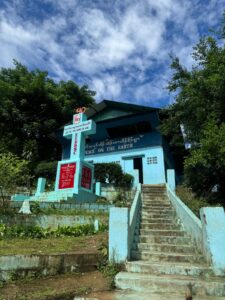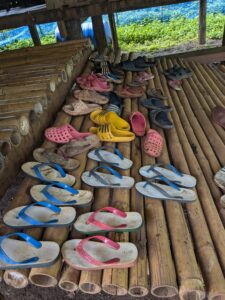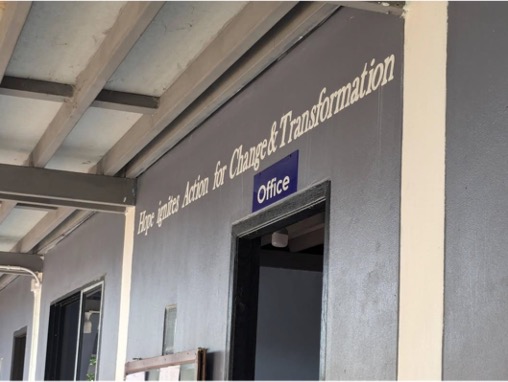September 19, 2024
21Wilberforce staff recently visited the Thai-Burma border to learn more about the important work conducted by the local faith-based institutions and relief agencies in the region. As the principal of the Kawthoolei Karen Bible College welcomed our 21Wilberforce team, we were greeted with the sound of a choir whose singing echoed throughout the camp. The seemingly heavenly music stood in sharp contrast with the daily reality faced by the people of Burma and those who have fled to this refugee camp in Thailand.
The college sits in the middle of the largest and oldest refugee camp in Thailand, Mae La Refugee Camp which was opened in 1984, and is located in the far west of Thailand close to the border with the Karen State of the country of Burma. The official number of refugees at the camp is over 37,000, of which more than three-quarters come from the Karen State, with smaller percentages coming from Mon State and Bamar-ethnicity majority areas.

Chapel at the Mae La Refugee Camp in Tak Province, Thailand
The Karen are one of the largest ethnic groups in Burma and have faced decades of conflict with the Burmese military junta that has greatly escalated since the military coup in 2021 and the ensuing civil war. The military conducts airstrikes or artillery bombardments on villages that support resistance forces or simply do not comply with military demands to help provide supplies and free labor to the army. The military also recently launched a new conscription law that allows them to draft men ages 18 to 45 and women ages 18 to 35 into the armed forces to fight their own people. This caused a large spike in refugees and internally displaced people fleeing to the border region. The UN estimates that, as of May 2024, there are an estimated 3,093,700 internally displaced people (IDPs) in Myanmar, and 1,139,500 refugees and asylum seekers in neighboring countries. We talked with relief workers from Karen-run agencies who shared that Thailand has officially taken over 90,000 refugees from Burma and estimated that there are as many as 100,000 more refugees who are not officially recognized. They shared that there is funding from the U.S., the U.K. and NGOs that support food and water supplies, education programs, and other programs for those who are displaced.
Amid these needs, the Bible college has operated for several generations, with current teachers often being students educated at the college. The college currently enrolls 600 students in its Biblical education program. They have forged a tight community of fellowship with their classes, choir practice, and shared meals. They also showed us their chapel, which had been rebuilt in 2012 after a fire burned down the old building. We then walked through well-kept classrooms and walls filled with pictures of previous graduates and Karen historical leaders who stood for their people. The principal told us, “While the challenges we face can be overwhelming, I continue to work in the outreach to this generation of our community knowing that God is the one who controls the results, not me.”
In addition to the Bible college, our team visited the Kawthoolei Hope Theological Seminary close to the nearby Thai city of Mae Sot. Rev. Dr. Wado, President of the seminary, shared his vision to help, “meet the immediate needs around us, but to also develop upstream solutions to break out of the continual loop of violence that the Karen have been trapped in for decades.” He said that there have been 42 separate peace talks, but that the situation has clearly not improved. His vision is being advanced by the students that the seminary trains in both a Master of Divinity program with 60 enrolled students and a newer Master of Arts in Socio-Cultural and Political Transformation program with 15 students. We saw new buildings the seminary had recently completed, including a library and classrooms, and the housing they were constructing for their professors. Over the doorway to one of the main classrooms, the words were printed, “Hope Ignites Action for Change and Transformation.” Dr. Wado, the professors, and the seminary students all actively participate in helping to meet the physical and spiritual needs of the displaced people from Burma in the region.

Flip-flops of students at IDP Camp
Some of the displaced people are seeking refugee status, the potential to stay in a camp in Thailand, or to resettle in another country, however many are not able to receive permission or choose to stay in border areas of Burma that are relatively safe. Our team helped deliver supplies that were going to some of these displaced people and talked with members of their community. Their entire village fled when a military camp was built close to them, and they feared that they would be exploited by the soldiers. While they relocated further away, they shared that they were still within range of the military’s artillery and lived with the knowledge that they could be targeted. We met with the village schoolteacher who was giving his students a geography test that morning. The village continues to educate its children and has set up a one-room, rectangular schoolhouse. When the resistance started, many educators throughout the country refused to continue to teach at the government-run schools as part of a broad civil disobedience movement and had to flee for their lives to areas controlled by the ethnic armies or to other countries. The act of hope of this small Karen village to continue to offer their children an education and a better future was beautiful to witness.
While the land of Burma is shaking under the weight of war, the leaders and students we met remain faithful by serving God and caring for others in their community. The example set by these individuals reminded us of the passage in 1st Peter which says, “As you come to him, a living stone rejected by men but in the sight of God chosen and precious, you yourselves like living stones are being built up as a spiritual house, to be a holy priesthood, to offer spiritual sacrifices acceptable to God through Jesus Christ.” (2:4-5, ESV). They are steadfast stones in the plan that God is building in the Karen community, trying to lay a foundation for the next generation of leaders that can build a more peaceful and just community, one stone at a time.

